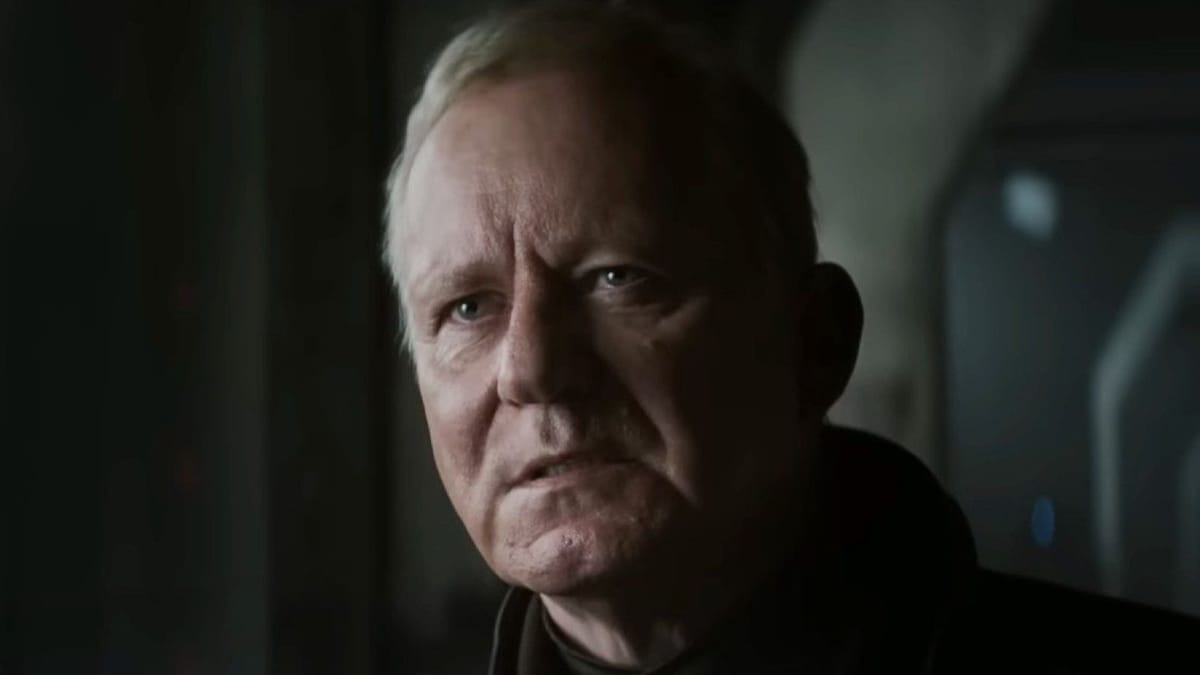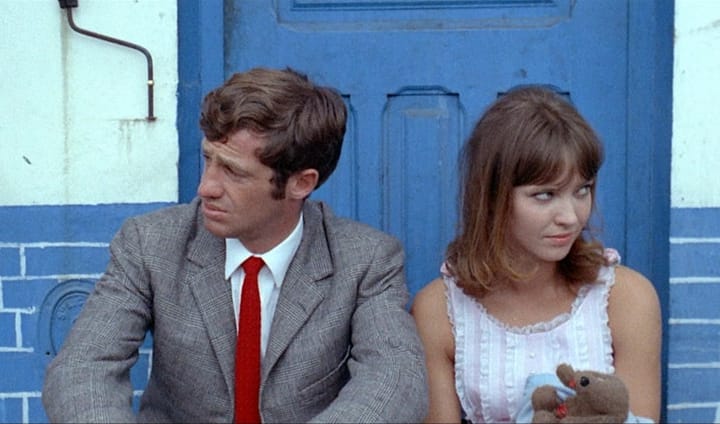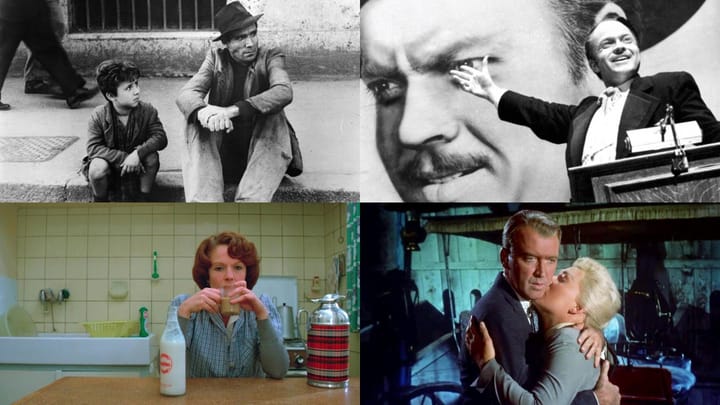Andor: Luthen's Legendary Monologue
The stirring speech encapsulates the qualities that make Andor stand out from other Star Wars projects, and speaks to the brutal reality that lies behind the myths of rebellion.

Among the glut of nostalgia bait that currently constitutes the Star Wars franchise, Andor stands out. The series, which returns next week for its second and final season, is not so much a Star Wars show as it is a prestige drama that happens to take place within the Star Wars universe. It avoids like the plague the easter eggs and franchise tie-ins which Disney Star Wars often subsists on. It features no lightsabers, only a couple brief space battles, and a heavy restraint on strange alien creatures. Its only returning characters outside of Cassian himself are a couple scenes of Saw Gerrera, who had a small role in Rogue One, and Mon Mothma, who previously had essentially existed only as a trivia answer. What is perhaps most indicative of the difference between Andor and the behemoth franchise it belongs to is what the show relies on instead: its spoken words. Star Wars is a franchise with more than a handful of iconic lines, but it almost never relies on dialogue itself to maintain interest. It is a series based in spectacle, thrilling fights and sweeping scores, and its dialogue has always lagged behind that spectacle as a rarely emphasized weak link. In every iteration of the series there are mocked points where shoddy dialogue comes to the fore (Taschi station, sand, they fly now). But Andor is built around its sharp dialogue; its most interesting scenes are usually just of people talking to each other. Even more prominent than the show’s emphasis on dialogue is its emphasis on monologue. There are a handful of speeches that form the centerpiece of the show and constitute its most memorable scenes. And among this group of monologues, there is one I have returned to again and again in the long break between seasons, that encapsulates more than any other scene what makes Andor special within its franchise: Luthen Rael’s monologue at the end of Episode 10.
Luthen’s monologue is one of a collection of four within the season’s final three episodes that constitute its main batch of monologues. The others – Kino Loy’s message over the intercom to the Narkina 5 prisoners earlier in Episode 10, Nemik’s manifesto delivered in voiceover in the finale, and Maarva’s posthumous address to the citizens of Ferrix in the finale driving them to riot – are straightforwardly inspirational speeches. They opine about the nature of oppression and the need to rise up and reclaim one’s freedom. Kino’s and Maarva’s monologues are both given to large crowds, literally rousing them into drastic acts of rebellion. These are monologues designed as rallying cries, meant to stir courage and ignite a revolution. Luthen’s monologue is different. It occurs not in public but deep in the underbelly of Coruscant, hundreds of stories below its globe-spanning city. It is not a broad statement of the principles of rebellion or a rousing call to action, but a deeply personal account of the costs such a rebellion incurs. In a way, the difference between the show’s other monologues and this one is a microcosm of the difference between the main Star Wars series and this show: between the simple myth of rebellion that becomes widely spread and the complicated, cruel reality that lies underneath that myth.
The setup for the speech: we follow Lonni, a man we have seen a handful of times as a supervisor for the Imperial Security Bureau, nervously walking through the back-alleys of Coruscant as he goes into an elevator and starts going way down. In the elevator he finds an earpiece. On the other end of it is Luthen’s voice. We come to understand that Lonni is a Rebel spy working undercover in the ISB. He tells Luthen that the ISB had learned about an upcoming rebel raid, and Luthen responds by saying he’d rather send 50 rebel fighters to their deaths than tip off the ISB to a leak by calling off the attack. The elevator reaches its destination, opens its doors, and Luthen ominously stands across from Lonni on a bridge, obscured in shadow. The real reason for the meeting comes to the fore: Lonni wants out. He has a child now and can’t carry the risk of being a double agent. Luthen is unsympathetic, tells Lonni he’s trapped, that they both know quitting is impossible, praises Lonni’s sacrifice as a true hero of the Rebellion. Lonni is incensed and asks Luthen what he sacrifices. Luthen gives his monologue in response:
Calm. Kindness. Kinship. Love. I’ve given up all chance at inner peace. I’ve made my mind a sunless space. I share my dreams with ghosts. I wake up every day to an equation I wrote 15 years ago from which there’s only one conclusion: I’m damned for what I do. My anger, my ego, my unwillingness to yield, my eagerness to fight, they’ve set me on a path from which there’s no escape. I yearned to be a savior against injustice without contemplating the cost and by the time I looked down there was no longer any ground beneath my feet. What is my sacrifice? I’m condemned to use the tools of my enemy to defeat them. I burn my decency for someone else’s future. I burn my life to make a sunrise that I know I’ll never see. And the ego that started this fight will never have a mirror or an audience or the light of gratitude. So what do I sacrifice? Everything!
You’ll stay with me, Lonni. I need all the heroes I can get.
Luthen is no Luke Skywalker. He does not get to blow up the Death Star or become a Jedi, and he certainly does not get to stand by his morals by sparing Darth Vader’s life and still win. He is a cold, cruel man who buries his conscience in order to do whatever it takes to advance the Rebellion, who in this very scene opts to sacrifice 50 men to preserve a single source and then forces that source back into a deathtrap. He cannot afford sentimentality or fairness. Luthen is no hero, cannot be a hero, not in the sense that a hero is someone who becomes a symbol, a paragon of righteous justice. He is the one who does the dirty work that lays the ground on which those heroes stand.
It is this emphasis on characters like Luthen, who dedicate their lives to fighting oppression but whom history will forget, that separates Andor from the rest of the Star Wars canon. Star Wars has historically been a mythical story, rooted in the monomyth of Joseph Campbell, based around a clear stratification between good and evil and heroes who win based on their adherence to the morally correct set of values. In the original trilogy, it suffices to say that the Rebels are good and the Empire is evil and leave the description at that, to insinuate that the good guys win because they use the Force and embrace love and mercy while the bad guys embrace hate and anger and their own technological might. The story is a parable and its characters are not so much people as archetypes, mythical figures whose legend is passed down through the generations. It is this mythical mode of storytelling that the franchise has retained through its history. Even as it has engaged in self-reflection, questioning the institution of the Jedi and the legends told about them, the fundamental conflict of the saga has still remained that between goodness itself and evil itself, and its fundamental focus has been on the actions of a few extraordinary heroes.
But it is at this fundamental level that Andor differs from the rest of Star Wars. It is a sociological, not a mythological, story. It has more in common with shows like The Wire than it does with Campbell’s hero’s journey. It does not simply label the Empire as evil by throwing a bunch of Nazi-inspired imagery at us, but delves into the nature of its oppression. It does not just label the Rebellion as good but explores how people and groups become radicalized into fighting for it. It does not paint the conflict between the two as a cosmological battle, but as a messy chess match rooted in details. The Rebellion and Empire are not ideological vessels, but institutions with their own logistical snarls, each facing internal struggles based on their organizational structure: the Rebellion from its disconnected factions struggling to work in sync, the Empire from its overwhelming bureaucracy. A major plotline of the first season is about the Rebellion struggling to move money around. And our main characters are not great warriors and wizards with fated significance through their special bloodlines, but ordinary people trying to scratch out an existence for themselves amidst the oppression and choosing to fight for a cause in whatever ways they can.
It is only under the complex sociological model of storytelling Andor embraces that we can find a character like Luthen. Under the mythological model, the self-damnation Luthen expresses in his monologue would be a contradiction. Fighting for the Rebellion means fighting on the side of good means that one is good themselves, aligned with the correct ideology the Rebellion represents. But when the Rebellion becomes an institution itself, an organization with a hierarchy and factions, modes of communication and methods of finance, dedicated towards a long-term strategy of unseating an autocratic fascist regime, and not just an ideological symbol, then people like Luthen become not just possible but necessary. Because in the real world, not the one we speak of in legends, nothing comes without a cost.
What Luthen’s monologue so powerfully communicates is that true resistance in the face of an oppressive system is not a simple matter of being a good person and doing good things. It is an active choice one must make again and again, a difficult choice, one that requires unspeakable sacrifice. One that might transform you into someone you never wanted to be, make you do things you never wanted to do. And there is no guarantee through the karmic forces of the universe that your sacrifice will ever be acknowledged. Some whiz kid farmboy will swoop in at the eleventh hour and fire the shot that blows up the Death Star and get a big ceremony where he gets a medal and you who whittled away all your humanity for the dream of one day achieving this moment will not be there. No one will even remember you. This is the price of true rebellion.
Luthen knows this. He has accepted it. And above this he knows that despite the unfairness of his lifelong sacrifice going unappreciated, the Rebellion needs those heroes. It needs a story it can sell to the rest of the galaxy, a figurehead untarnished by the cruelty Luthen has had to make his kin. Today his hero is Lonni, later it will be Cassian, and at some point far in the future it will be Luke and Leia. And with the same calculating iciness with which he sacrifices his allies and quashes Lonni’s hopes of escaping his double life, he lays his pride and personal desires to the side and makes sure that his sins will not interfere with the glory that those who climb on his shoulders will receive. It is the only way.
Andor with its sociological focus does not negate the mythology of the broader Star Wars franchise. Just as much as it dives into the gutters and brunt work of the Rebellion, it gives us inspirational speeches about rising up against oppression and depicts acts of true heroism. But it does serve as a reminder that these moments of mythical rebellion are the tip of an iceberg of calculated action and crippling sacrifice that have made them possible. That behind every Luke Skywalker and Leia Organa, behind every Gandhi, Mandela, and King, there are the Luthens of the world, who burned their lives and never got to see the sunrise. That rebellions are told as legends led by mythical heroes, but that they are built by ordinary people who made the hard choice time after time and paid for it. It may mean sacrificing everything, but we must fight the Empire. We need all the heroes we can get.
The Art Newsletter
Creativity. Culture. Community.
Every Thursday, we send a carefully curated drop of stories, tools, and creative insight for the next generation of artists, musicians, filmmakers, designers, and thinkers.
From cultural commentary to personal reflections, viral trends to overlooked gems. We cover what’s happening and what matters. Want local updates too? Join our Austin list for events, meetups, and opportunities.





Comments ()